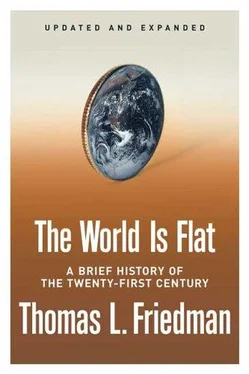You know “the IT revolution” that the business press has been touting for the last twenty years? Sorry, but that was only the prologue. The last twenty years were just about forging, sharpening, and distributing all the new tools with which to collaborate and connect. Now the real IT revolution is about to begin, as all the complementarities between these tools start to really work together to level the playing field. One of those who pulled back the curtain and called this moment by its real name was HP's Carly Fiorina, who in 2004 began to declare in her public speeches that the dot-com boom and bust were just “the end of the beginning.” The last twenty-five years in technology, said Fiorina, then the CEO of HP, have been just “the warm-up act.” Now we are going into the main event, she said, “and by the main event, I mean an era in which technology will literally transform every aspect of business, every aspect of life and every aspect of society.”
FOUR: The Great Sorting Out
The triple convergence is not only going to affect how individuals prepare themselves for work, how companies compete, and how countries organize their economies and geopolitics. Over time, it is going to reshape political identities, recast political parties, and redefine who is a political actor. In short, in the wake of this triple convergence that we have just gone through, we are going to witness what I call “the great sorting out.” Because when the world starts to move from a primarily vertical (command and control) value-creation model to an increasingly horizontal (connect and collaborate) creation model, it doesn't affect just how business gets done. It affects everything-how communities and companies define themselves, where companies and communities stop and start, how individuals balance their different identities as consumers, employees, shareholders, and citizens, and what role government has to play. All of this is going to have to be sorted out anew. The most common disease of the flat world is going to be multiple identity disorder, which is why, if nothing else, political scientists are going to have a field day with the flat world. Political science may turn out to be the biggest growth industry of all in this new era. Because as we go through this great sorting out over the next decade, we are going to see some very strange bedfellows making some very new politics.
I first began thinking about the great sorting out after a conversation with Harvard University's noted political theorist Michael J. Sandel. Sandel startled me slightly by remarking that the sort of flattening process that I was describing was actually first identified by Karl Marx and Friedrich Engels in the Communist Manifesto, published in 1848. While the shrinking and flattening of the world that we are seeing today constitute a difference of degree from what Marx saw happening in his day, said Sandel, it is nevertheless part of the same historical trend Marx highlighted in his writings on capitalism-the inexorable march of technology and capital to remove all barriers, boundaries, frictions, and restraints to global commerce.
“Marx was one of the first to glimpse the possibility of the world as a global market, uncomplicated by national boundaries,” Sandel explained. “Marx was capitalism's fiercest critic, and yet he stood in awe of its power to break down barriers and create a worldwide system of production and consumption. In the Communist Manifesto, he described capitalism as a force that would dissolve all feudal, national, and religious identities, giving rise to a universal civilization governed by market imperatives. Marx considered it inevitable that capital would have its way-inevitable and also desirable. Because once capitalism destroyed all national and religious allegiances, Marx thought, it would lay bare the stark struggle between capital and labor. Forced to compete in a global race to the bottom, the workers of the world would unite in a global revolution to end oppression. Deprived of consoling distractions such as patriotism and religion, they would see their exploitation clearly and rise up to end it.”
Indeed, reading the Communist Manifesto today, I am in awe at how incisively Marx detailed the forces that were flattening the world during the rise of the Industrial Revolution, and how much he foreshadowed the way these same forces would keep flattening the world right up to the present. In what is probably the key paragraph of the Communist Manifesto, Marx and Engels wrote:
All fixed, fast, frozen relations, with their train of ancient and venerable prejudices and opinions, are swept away, all new-formed ones become antiquated before they can ossify. All that is solid melts into air, all that is holy is profaned, and man is at last compelled to face with sober senses his real conditions of life and his relations with his kind. The need of a constantly expanding market for its products chases the bourgeoisie over the whole surface of the globe. It must nestle everywhere, settle everywhere, establish connections everywhere. The bourgeoisie has through its exploitation of the world market given a cosmopolitan character to production and consumption in every country. To the great chagrin of reactionaries, it has drawn from under the feet of industry the national ground on which it stood. All old-established national industries have been destroyed or are daily being destroyed. They are dislodged by new industries, whose introduction becomes a life and death question for all civilised nations, by industries that no longer work up indigenous raw material, but raw material drawn from the remotest zones; industries whose products are consumed, not only at home, but in every quarter of the globe. In place of the old wants, satisfied by the production of the country, we find new wants, requiring for their satisfaction the products of distant lands and climes. In place of the old local and national seclusion and self-sufficiency, we have intercourse in every direction, universal inter-dependence of nations. And as in material, so also in intellectual production. The intellectual creations of individual nations become common property. National one-sidedness and narrow-mindedness become more and more impossible, and from the numerous national and local literatures there arises a world literature.
The bourgeoisie, by the rapid improvement of all instruments of production, by the immensely facilitated means of communication, draws all, even the most barbarian nations into civilisation. The cheap prices of commodities are the heavy artillery with which it barters down all Chinese walls, with which it forces the barbarians' intensely obstinate hatred of foreigners to capitulate. It compels all nations, on pain of extinction, to adopt the bourgeois mode of production; it compels them to introduce what it calls civilisation into their midst, i.e., to become bourgeois themselves. In one word, it creates a world after its own image.
It is hard to believe that Marx published that in 1848. Referring to the Communist Manifesto, Sandel told me, “You are arguing something similar. What you are arguing is that developments in information technology are enabling companies to squeeze out all the inefficiencies and friction from their markets and business operations. That is what your notion of'flattening' really means. But a flat, frictionless world is a mixed blessing. It may, as you suggest, be good for global business. Or it may, as Marx believed, augur well for a proletarian revolution. But it may also pose a threat to the distinctive places and communities that give us our bearings, that locate us in the world. From the first stirrings of capitalism, people have imagined the possibility of the world as a perfect market— unimpeded by protectionist pressures, disparate legal systems, cultural and linguistic differences, or ideological disagreement. But this vision has always bumped up against the world as it actually is-full of sources of friction and inefficiency. Some obstacles to a frictionless global market are truly sources of waste and lost opportunities. But some of these inefficiencies are institutions, habits, cultures, and traditions that people cherish precisely because they reflect nonmarket values like social cohesion, religious faith, and national pride. If global markets and new communications technologies flatten those differences, we may lose something important. That is why the debate about capitalism has been, from the very beginning, about which frictions, barriers, and boundaries are mere sources of waste and inefficiency, and which are sources of identity and belonging that we should try to protect. From the telegraph to the Internet, every new communications technology has promised to shrink the distance between people, to increase access to information, and to bring us ever closer to the dream of a perfectly efficient, frictionless global market. And each time, the question for society arises with renewed urgency: To what extent should we stand aside, 'get with the program,' and do all we can to squeeze out yet more inefficiencies, and to what extent should we lean against the current for the sake of values that global markets can't supply? Some sources of friction are worth protecting, even in the face of a global economy that threatens to flatten them.”
Читать дальше












